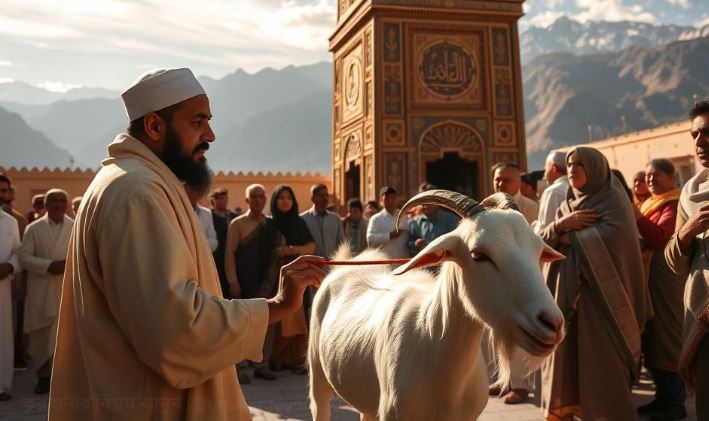কুরবানীর নিয়ম কানুন | Qurbanir Niyom
Qurbani, an Islamic ritual, holds significant importance worldwide, particularly during specific times of the year. It is a practice deeply rooted in religious tradition.
The importance of Qurbani lies in its spiritual and social implications. It symbolizes obedience and submission to divine will.
Understanding Qurbani rules is essential for Muslims globally, including those in the United States, to perform this ritual correctly.
Key Takeaways
- Qurbani is a significant Islamic ritual.
- Understanding Qurbani rules is crucial.
- Qurbani signifies obedience and submission.
- It holds spiritual and social importance.
- Qurbani is observed by Muslims worldwide.
The Sacred Tradition of Qurbani
The practice of Qurbani is a sacred tradition that connects Muslims worldwide to their faith’s heritage. It is an act deeply ingrained in Islamic identity, embodying the values of sacrifice, obedience, and compassion.
Religious Significance and Spiritual Benefits
Qurbani holds profound religious significance, symbolizing the unwavering faith and submission of Prophet Ibrahim and his son Ismail. This act is believed to purify the soul and strengthen one’s connection with Allah. The spiritual benefits of Qurbani include fostering a sense of community and promoting values of charity and generosity.
“And We ransomed him with a great sacrifice, so that they may invoke My Name.”
Historical Origins from Prophet Ibrahim’s Story
The historical origins of Qurbani are rooted in the story of Prophet Ibrahim, who Allah commanded to sacrifice his son. This narrative is a testament to Ibrahim’s unshakeable faith and willingness to submit to Allah’s will. The act of Qurbani reenacts this event, reinforcing the values of obedience and trust in divine providence.
Who is Obligated to Perform Qurbani
In Islam, Qurbani is obligatory for those who meet specific criteria, typically related to financial means and the ability to afford the sacrifice. The obligation is usually assessed based on an individual’s wealth and possessions, ensuring that the act is performed with sincerity and without undue hardship.
কুরবানীর নিয়ম কানুন | Qurbanir Niyom: Essential Rules
To perform Qurbani correctly, one must understand its essential rules. Qurbani, or the act of sacrifice, is a significant Islamic tradition that requires adherence to specific guidelines.
Selection Criteria for Sacrificial Animals
Strict criteria govern the selection of sacrificial animals. The animals must meet specific age and health requirements.
Age Requirements for Different Animals
- Goats and sheep: At least 1 year old.
- Cows and oxen: At least 2 years old.
- Camels: At least 5 years old.
Health and Physical Conditions
The animals should be free from any defects or health issues, ensuring they are physically fit for sacrifice.
| Animal | Minimum Age | Health Requirements |
| Goat/Sheep | 1 year | Free from defects |
| Cow/Ox | 2 years | No visible illness |
| Camel | 5 years | Physically sound |
Prescribed time for Sacrifice
The sacrifice must be performed within the specified time frame, typically after the Eid prayer on the 10th of Dhul-Hijjah.
Intention (Niyyah) and Dedication
The intention behind Qurbani is crucial. It should be performed solely for the sake of Allah, with utmost dedication and sincerity.
Practical Implementation in the United States
Performing Qurbani in the United States requires understanding local options and guidelines. Muslims in the U.S. can fulfill their Qurbani obligations by exploring various local resources and services designed to facilitate this sacred tradition.
Local Options for Performing Qurbani
Several local options are available for Muslims to perform Qurbani in the United States. Many mosques and Islamic centers organize Qurbani programs, allowing individuals to participate directly or through donations. Local farms and slaughterhouses that adhere to Islamic guidelines also provide sacrificial services.
Qurbani Donation Programs and Services
For those who cannot perform Qurbani personally, donation programs offer an alternative. Reputable organizations facilitate Qurbani on behalf of donors, ensuring the meat is distributed to those in need globally. As the Prophet Muhammad (peace be upon him) said,
“The best of charity is to give food to the needy.”
Distribution Guidelines for Meat
After Qurbani, the meat is typically divided into three portions:
- One-third for personal consumption
- One-third for charity
- One-third for gifts
Personal Consumption Portion
The portion retained for personal consumption allows families to enjoy the fruits of their Qurbani, fostering a sense of community and gratitude.
Charity and Gift Portions
The charity portion supports the less fortunate, while gifts to friends and family promote goodwill and strengthen bonds.
Conclusion
The significance of Qurbani lies in its spiritual and social implications, as it embodies the values of sacrifice, compassion, and community. Understanding the Qurbani rules is essential to observe this Islamic tradition sincerely. By following the prescribed guidelines and regulations, Muslims can ensure that their Qurbani is performed in accordance with Islamic principles.
The importance of Qurbani is rooted in its ability to foster a sense of unity and cooperation among Muslims. As they come together to perform this sacred tradition, they reaffirm their commitment to the values of empathy, generosity, and selflessness. By observing Qurbani with sincerity and dedication, Muslims can deepen their connection with the divine and with their community.





